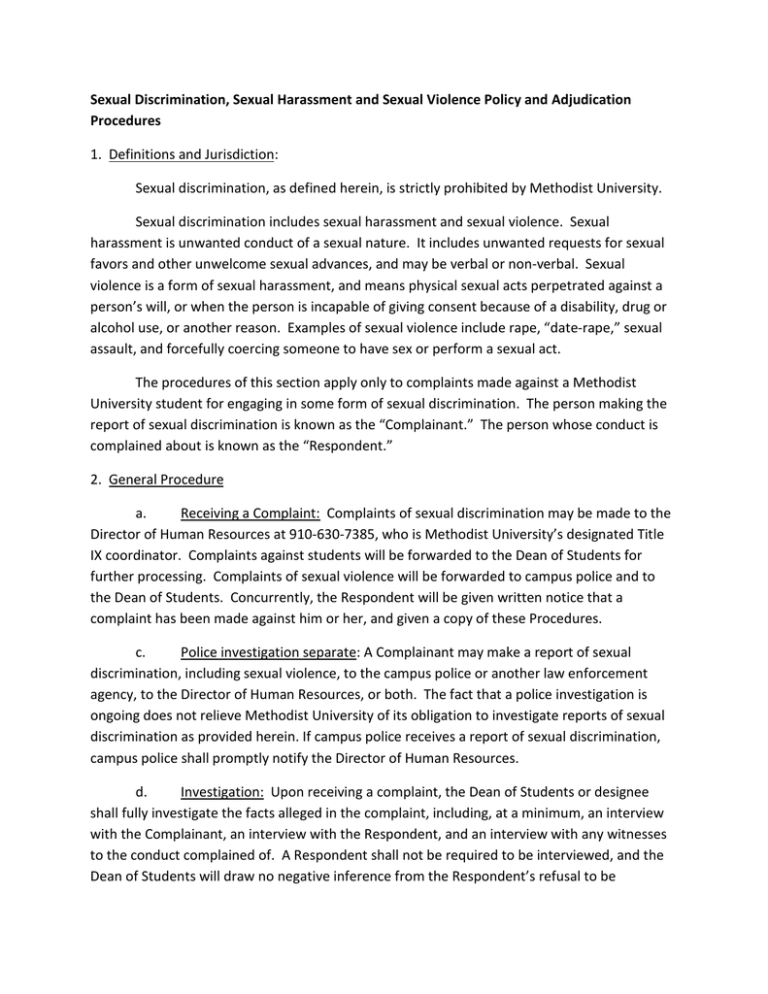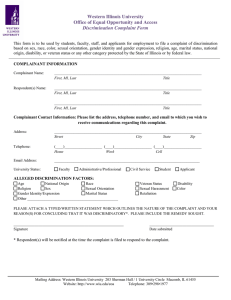
Sexual Discrimination, Sexual Harassment and Sexual Violence Policy and Adjudication
Procedures
1. Definitions and Jurisdiction:
Sexual discrimination, as defined herein, is strictly prohibited by Methodist University.
Sexual discrimination includes sexual harassment and sexual violence. Sexual
harassment is unwanted conduct of a sexual nature. It includes unwanted requests for sexual
favors and other unwelcome sexual advances, and may be verbal or non-verbal. Sexual
violence is a form of sexual harassment, and means physical sexual acts perpetrated against a
person’s will, or when the person is incapable of giving consent because of a disability, drug or
alcohol use, or another reason. Examples of sexual violence include rape, “date-rape,” sexual
assault, and forcefully coercing someone to have sex or perform a sexual act.
The procedures of this section apply only to complaints made against a Methodist
University student for engaging in some form of sexual discrimination. The person making the
report of sexual discrimination is known as the “Complainant.” The person whose conduct is
complained about is known as the “Respondent.”
2. General Procedure
a.
Receiving a Complaint: Complaints of sexual discrimination may be made to the
Director of Human Resources at 910-630-7385, who is Methodist University’s designated Title
IX coordinator. Complaints against students will be forwarded to the Dean of Students for
further processing. Complaints of sexual violence will be forwarded to campus police and to
the Dean of Students. Concurrently, the Respondent will be given written notice that a
complaint has been made against him or her, and given a copy of these Procedures.
c.
Police investigation separate: A Complainant may make a report of sexual
discrimination, including sexual violence, to the campus police or another law enforcement
agency, to the Director of Human Resources, or both. The fact that a police investigation is
ongoing does not relieve Methodist University of its obligation to investigate reports of sexual
discrimination as provided herein. If campus police receives a report of sexual discrimination,
campus police shall promptly notify the Director of Human Resources.
d.
Investigation: Upon receiving a complaint, the Dean of Students or designee
shall fully investigate the facts alleged in the complaint, including, at a minimum, an interview
with the Complainant, an interview with the Respondent, and an interview with any witnesses
to the conduct complained of. A Respondent shall not be required to be interviewed, and the
Dean of Students will draw no negative inference from the Respondent’s refusal to be
interviewed. The interviews shall be recorded, and any relevant documents or other evidence
gathered by the Dean of Students or designee will be preserved. The Dean of Students or
designee shall make all reasonable efforts to conduct a full and fair investigation within thirty
calendar days from receipt of a complaint.
e.
Interim Measures: The University will not automatically restrict a student from
attending classes or participating in other University activities on the basis of a complaint of
sexual discrimination. However, Methodist University reserves the right to impose interim
remedial measures at any time upon receiving a report of sexual discrimination, if the
University has concerns about the safety of the Methodist community. Such measures may
include, but are not limited to, restrictions regarding movement on campus, removal from
University housing and/or removal from campus. The decision to impose interim measures is
made by the Dean of Students. The University will also enforce any court order.
f.
Retaliation prohibited: Retaliation against anyone who brings forward a
complaint of sexual discrimination is strictly prohibited. Anyone responsible for retaliation or
threats of retaliation, whether that person is the accused party, someone affiliated with the
accused (i.e. a friend or family member), or any other party, will be subject to disciplinary
action by the University. Retaliation should be reported promptly to the Dean of Students.
Retaliation by a person not affiliated with the University may be addressed by the police.
3. Adjudication:
a.
Dean of Student’s Referral: Upon completion of his or her investigation the
Dean of Students or designee shall:
i.
If, in the interview with the Dean of Students or designee, the
Respondent denied committing the conduct complained of or if the Respondent refused to be
interviewed, the Dean of Students or designee shall refer the case to the Administrative
Hearing Board.
ii.
If, in the in the interview with the Dean of Students or designee, the
Respondent admitted committing the conduct complained of, the Dean of Students or designee
shall order an appropriate sanction, and shall consider a range of sanctions from no sanction to
expulsion.
b.
Administrative Hearing Board: The Hearing Board shall be made up of five
members of the Methodist University community and shall be comprised of faculty and staff.
The Hearing Board shall convene within five calendar days of the Dean of Students or designee
referring his or her report to its Chairperson. The proceedings of the Hearing Board shall be
recorded or memorialized, and the recording or memorialization shall be preserved. Attorneys
shall not be permitted at the proceedings, and the proceedings shall not be open to the public.
i.
The Hearing Board shall consider the investigation of the Dean of
Students or designee, including recorded interviews, documents, and other evidence, and the
submissions of the Complainant and Respondent, if any. The Hearing Board will not draw an
inference of responsibility from the Respondent’s refusal to submit materials for its
consideration or refusal to be interviewed by the Dean of Students. The Hearing Board may
decide the case based solely on the record presented to it.
ii.
If the Hearing Board believes further investigation is necessary, it may:
(1)
Send a written request or email to the Dean of Students asking
him or her to conduct further recorded interviews or attempt to obtain other evidence, which
request the Dean of Students shall make every effort to comply with within five calendar days;
and/or,
(2)
Recess and gather additional documents and evidence on its own,
and then reconvene to consider it; and/or
(3)
Recess to make arrangement to question witnesses, and
reconvene to do so. Witnesses may be questioned, in-person or through other means, except
that the Respondent may not be required to testify in front of the Hearing Board and no
negative inference may be drawn by the Respondent’s refusal to do so.
iii.
When the Hearing Board has satisfied itself that it has fully considered
the facts alleged in the complaint, it shall, by a simple majority vote, make a determination that
more likely than not the Respondent committed sexual discrimination as defined herein, or
more likely than not the Respondent did not commit sexual discrimination as defined herein.
iv.
The Hearing Board shall promptly inform the Dean of Students or
designee, in writing or by email, of its determination.
c.
Sanctions:
If the Hearing Board determines that the Respondent committed
sexual discrimination as defined herein, the Hearing Board shall order an appropriate sanction,
and shall consider a range of sanctions from no punishment to expulsion. The Dean of Students
shall promptly inform the Respondent of the Hearing Board’s determination and of the sanction
imposed, if any, and shall promptly inform the Complainant of the Hearing Board’s
determination and of any sanction imposed which relates directly to the Complainant (e.g., a
transfer of the Respondent to another residence hall or out of the Complainant’s classes).
4. Appeal: The Complainant or Respondent may appeal the Hearing Board’s determination,
the sanction, or both within two business days of being informed of the Hearing Board’s
determination. Appeals must be in writing and are made and adjudicated by the Appeal Board
pursuant to the procedures of that body. However, notwithstanding any provision of the
Student Handbook to the contrary, when adjudicating an appeal of sexual discrimination, the
Appeal Board shall simultaneously consider whether grounds for an appeal exist, and
adjudicate the appeal. When so proceeding, the Appeal Board may consider only the record of
the case, including any written submissions by the Complainant, and its proceedings are closed.
Its proceedings, however, shall be recorded or memorialized and the recordings or
memorialization preserved. The decision of the Appeal Board is final. When adjudicating cases
of sexual discrimination, the Appeal Board may, in its sole discretion and if it deems doing so is
necessary to prevent a manifest injustice, receive and consider new evidence not previously
considered in a matter, if such new evidence was not available at an earlier stage of the
investigation and adjudication. The Appeal Board shall make all reasonable efforts to render its
decision within ten calendar days of receiving an appeal.
5. Notice to Complainant: After the Appeal Board determines the appeal, or after the time for
an appeal lapses if no appeal is filed, the Dean of Students or designee shall inform the
Complainant that no appeal was filed, or if an appeal was filed, of the determination of the
Appeal Board and of any sanction imposed which relates directly to the Complainant (e.g., a
transfer of the Respondent to another residence hall or out of the Complainant’s classes).





